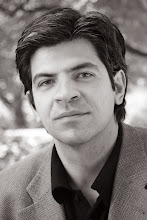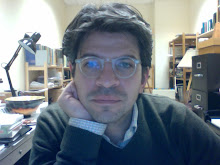

On December 7 and 8, 2007 David Milnes conducted my score to David Green's short film the Flyer at Hertz Hall. The Berkeley University Symphony performed the score live to an overhead projection of the film. I wanted to take this opportunity to reflect on the film scoring process and on film music in general.
First of, this is a unique situation. The film maker provided me with a first-rate film to work with, which was not generally the case during my years as a film composer in Hollywood. David Green proved to be a very intelligent, sensitive, resourceful and responsive collaborator, and despite his very young age, he had the wisdom to not micro-manage the composing process. This gave me tremendous freedom and confidence to do my part as best as possible. I agreed to score the film on one condition: that we would use an orchestral score, regardless of what and how long it took. This meant that I also was free of insane deadlines ( I have composed entire scores in the past in as little as a week), as we had to follow the orchestra's schedule to record, which also meant rehearsals (another non-entity in Hollywood). It took a little over two years to get the orchestra's and the conductor's schedules in sync with my own (in the meantime I finished my PhD and studied in Paris for two years). Finally, it all came together at the beginning of the Fall semester, and we got the green light.
I actually took the time to completely re-write the score, since what was originally planned as a recording session/reading became essentially a concert suite. So, what was originally a set of short cues, meant to be conducted by using click-tracks, became a 10+ minute piece for orchestra, which David Milnes conducted with no synchronization aids, just by learning the movie and following it. The musicians got to practice and learn the score, and they all got mp4 files of the film, so they knew exactly how their parts fit in with the dramatic unfolding of the film. This is far from a real-world situation!
The score itself, though at times referential to what one would expect a film score to sound like, can actually stand as an autonomous piece of its own, and since it's the only audio element in the movie (no dialogue, no sound FX), it becomes the voice of the characters. So, I chose not to merely comment on the visual action (sometimes referred to as "Mickey-mouse music" in Hollywood), but to actually create a parallel narrative. Since the nature of the movie is quite complex, and the main character constantly torn and uncertain about his life choices, I wrote a score that also works in several layers at once. Instead of using the music to guide the viewer emotionally, I chose to make it even more of a personal experience for the viewer, who has to make sense of it all in his/her own way.
The result is not up to me to judge, but it was received very well, and Hertz Hall was full both nights. If that's the measure of success, I guess the whole thing worked. David Milnes did an amazing job, as always, of materializing my quite complex orchestral ideas, and making it look easy. The University Symphony is better than ever, and the musicians gave their all. I thank them from the bottom of my heart.
Here's the blog of an audience member:

